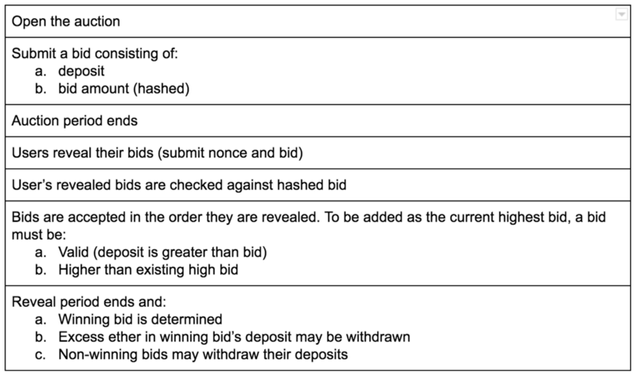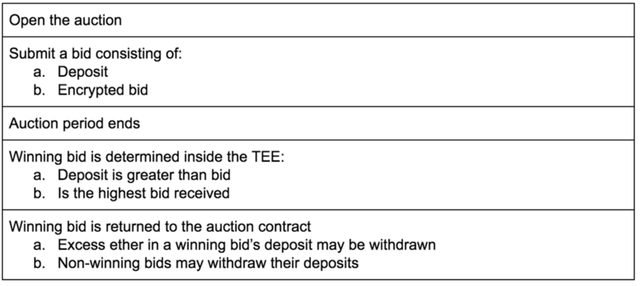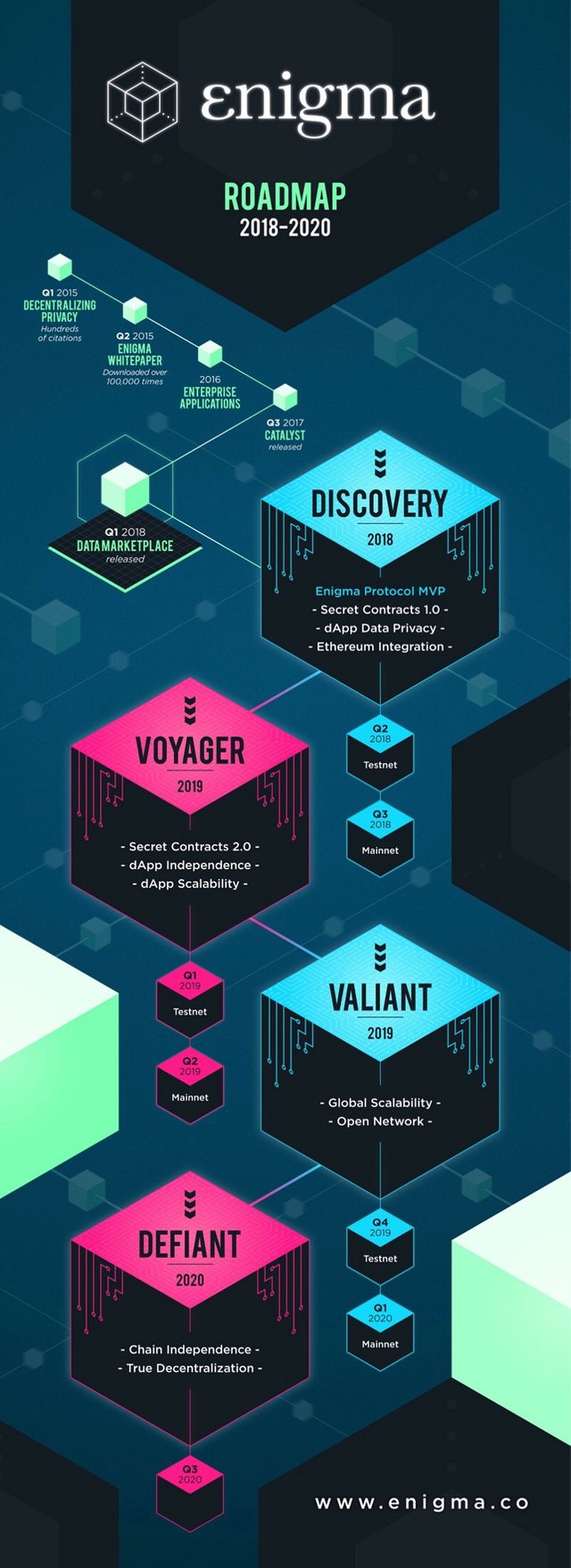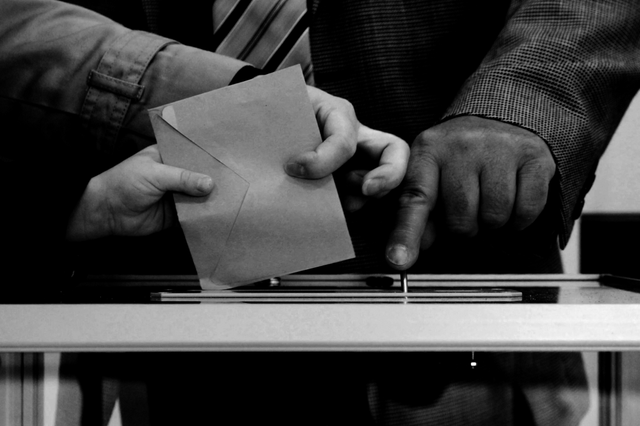How Enigma is Changing The World With Dark DAOs, Secret Auctions, Private Voting, Secret ICOs to Provide You The Privacy That is Non-negotiable Without Compromising Trust
Enigma is one of those projects that just have to be a 100 bagger. There is no way that it is only worth 54 million USD. 100 times of that is an easy possibility. Enigma is a project developed with the involvement of people from MIT and many other academic institutions and they are collaborating with Intel. Their solution is scalable privacy in smart contracts. Years after Bitcoin because a thing, Ethereum came to existence. It changed the whole game by taking DLT/Blockchain usage to a whole new level. Around the same time, privacy coins started to become a thing. Enigma is the privacy coin equivalent of smart contracts.

Let's Try AMA
The devs are the best source in crypto. AMAs and Whitepapers are the best place for answers. The first Developer Forum AMA is on August 14th! You can ask questions about their protocol, vision, and ecosystem. Just follow this link and ask what you need to know: https://forum.enigma.co/c/enigma-august-ama There are many very good detailed questions waiting on the list. Make sure that your questions are on par with the rest of them.
The Secret ICO
This is an alternative approach to Decentralized ICOs of Komodo. If you've been following things closely, there was a lot of talk about @ned powering down and people started saying various things. I did my own analysis on the matter and I do think all these account stalking can be a massive problem when it comes to sensitive and private matters which EOS doesn't offer any solutions for. But Enigma understands.
The problem today with all blockchains is that information that’s stored on the ledger — including smart contract data — is completely public. In the context of an ICO, this means that once the token smart contract is initialized (i.e., the Token Generation Event), the full distribution of token holders become publicly visible. In other words, everyone — including the swarms of potential hackers trying to separate people from their funds, can see precisely the holdings of each wallet — and therefore of each individual.
Furthermore, it’s become common practice to follow users’ holdings, particularly those with large sums, trying to discern their behavior and trading habits. At best, these kind of actions are a breach of individual privacy. At worse, the same techniques can be used by attackers to deanonymize and recognize individual honeypots, focusing their efforts on hacking their accounts. Importantly, these same risks extend to the token issuers, whose own retained tokens can become the target of malicious actors.
To make matters much worse, most ICOs today require their contributors to submit sensitive KYC/AML data, which includes your ID, among other things. If that information ever leaks, then it becomes trivial to link your real identity to your actual wallet holdings, exacerbating the risk to token holders. If you’re an avid crypto investor, you’re likely to participate in many projects over time, which linearly increases your exposure. Given these substantial risks to our privacy and (more importantly) our security, we propose a re-design of ICOs so that they actually protect the privacy and security of all token holders. Enigma calls these Secret ICOs — and they also implicitly generate privacy tokens.
Source
There is even Secret Auctions
This is the first time I'm seeing this in any crypto project. It's a lot similar to sealed bid auctions Here is a description:
It’s not possible to do true sealed-bid auctions on Ethereum alone. This is because the blockchain itself replaces the role of ‘auctioneer’. Even hashed bid amounts must be revealed and made visible on-chain in order for the auction to be decided. Ethereum uses the “commit-reveal” design to achieve auctions that are sealed until the end of the auction. Enigma allows non-winning bids to remain encrypted, protecting the bid amounts even after the auction ends, while still ensuring that the highest bid wins the auction.
Aside from an improved user experience, this is important to prevent bidding ring collusion: the practice of a group of powerful buyers agreeing not to compete against one another, and to either take turns or resell on a secondary market. This is important to both the seller, who loses money if high-value bidders cooperate instead of compete, and to less-powerful bidders, who can be more likely to win an auction at their value when high-value bidders do not know who they are competing against, and thus must bid their true value. In a collusion ring, a high-value bidder participating in a second-price auction can be relatively assured that they will win at a reasonable price with an overly large bid.
Source
The Difference Between Normal Smart Contract Platforms and Enigma


A Summery Diagram
While blockchain is great for correctness and transparency, it fails in privacy. - Enigma Team
An Example With Secret Contracts and Credit Scores
1) Alice uses a HTML based decentralized application (dApp, like Metamask), that hosts an Enigma client, to login to her online bank platform using OAuth. This is similar to a Login with Facebook prompt.
2) dApp retrieves API keys (token + secret) that enables the dApp to login or retrieve data from Alice’s online banking platform on behalf of Alice.
3) Using the Enigma client, dApp encrypts Alice’s API keys, using the public key to the trusted execution environment (TEE) run inside the Enigma network.
4)Encrypted API keys (Encrypted_token, secret) are pushed to a Decentralized Credit Scoring Contract, which is a smart contract on Ethereum network and registered in Enigma Secret Contract registry contract on Ethereum.
5)Enigma network listener identifies the encrypted inputs to the Decentralized Credit Scoring Contract and copies this contract and the encrypted API keys to the Enigma network.
6)Alice’s API Keys are decrypted inside the Enigma node (Enigma VM) that is randomly chosen by the protocol.
7)Enigma node securely connects to Alice’s profile in the online banking platform (get_tx_data)
8) Enigma node securely retrieves Alice’s transaction data to the VM inside the TEE that runs Decentralized Credit Scoring Contract.
9) Alice’s transaction information is fed into Decentralized Credit Scoring Contract inside enclave and the computation takes place (scoring_function(tx_data))
10) Alice’s credit score is calculated within the Enigma network and the result is submitted to Ethereum network
11) HTML based dApp can retrieve Alice’s score from the Ethereum chain and show it to interested parties, including Alice.
The Dark DAO
Dash was the first DAO and soon there was Bitshares Decentralized Autonomous Company. Ethereum is not a real DAO. It doesn't have real on-chain governance. Enigma is an ambitions gem that dare to imagine: "What if governance worked like privacy coins?"
Using secret contracts, it is possible to hold votes where the results can be trusted, but the individual votes are never revealed. In a secret vote, a token holder encrypts their vote using the public key of the TEE. Then, this vote is submitted to the voting contract. When the voting period is concluded, the votes are decrypted and counted within the TEE, which returns the result of the vote but not the individual votes themselves. This solves vote manipulation attacks during voting, after voting, and in repeated rounds of voting. As with PLCR, this also prevents “vote memeing”, while improving on PLCR in usability. Unlike PLCR, votes are never committed unencrypted.
But Why?
Let me give you an example. Let's say some commie dictator gains power like Hitler who was democratically elected. Then the dictator starts perusing political enemies. The same thing happen in a company. Similar things could happen among neighbors or school children.
Public voting is not always the best way. In a civilized group things can do well. But we are dealing with trustless and permissionless systems and real world usages could have their own IRL consequences.
Using secret contracts, it is possible to hold votes where the results can be trusted, but the individual votes are never revealed. In a secret vote, a token holder encrypts their vote using the public key of the TEE. Then, this vote is submitted to the voting contract. When the voting period is concluded, the votes are decrypted and counted within the TEE, which returns the result of the vote but not the individual votes themselves. This solves vote manipulation attacks during voting, after voting, and in repeated rounds of voting. As with PLCR, this also prevents “vote memeing”, while improving on PLCR in usability. Unlike PLCR, votes are never committed unencrypted.
Another facet of non-private voting is that it provides an opportunity for malicious actors to attempt to influence the outcome of a vote through bribery. If I can prove that I voted a certain way, I can collect on a promised bribe. In the decentralized world, such a bribe could be extremely trustworthy: for example, it could be encoded into a smart contract.
Because voting with the majority results in financial reward for token-holders, there is an incentive to predict which way the majority will vote, rather than according to a voter’s due diligence. If enough voters act in this way, it can result in “vote memeing”, where individuals simply vote with the majority rather than to improve the quality of the TCR. While this devalues the TCR in the long-run, it is a compelling strategy in the short-term.
Source
Roadmap



You got voted by @votefun thanks to Zero. We are still in early alpha, users can use us to get free upvotes. This is mainly directed towards users of the @cryptowithincin bot. We are in a few discord servers. To get full benefits, you have to be subscribed to @cryptowithincin. To support us, you can delegate to @votefun or just give this comment a upvote. Or you can even use http://votefun.tk/ to trade your STEEM/SBD for other coins. We charge a 0.1% fee and most of that will be used to help votefun get more steempower.
Unpaid related articles
Related articles
Interesteem(@interesteem) is a service that recommends related articles using DeepLearning.
Please write an article with #interesteem tag.
Curated for #informationwar (by @commonlaw)
Our purpose is to encourage posts discussing Information War, Propaganda, Disinformation and other false narratives. We currently have over 7,500 Steem Power and 20+ people following the curation trail to support our mission.
Join our discord and chat with 200+ fellow Informationwar Activists.
Join our brand new reddit! and start sharing your Steemit posts directly to The_IW!
Connect with fellow Informationwar writers in our Roll Call! InformationWar - Contributing Writers/Supporters: Roll Call Pt 11
Ways you can help the @informationwar